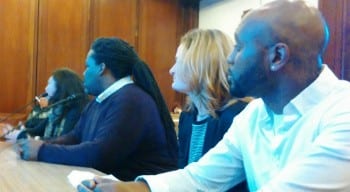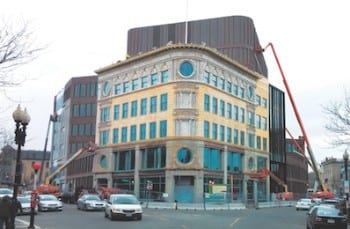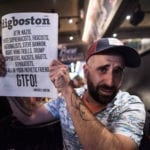Image by Brittany Grabowski
When the Massachusetts legislature greenlighted new liquor licenses last session for certain Boston neighborhoods that lack adequate entertainment options, it was a cause for celebration. Residents of areas like Roxbury, with its 15 permits (including 10 held by packies) to the 131 in Back Bay, rejoiced at the prospect of more places to sip wine at dinner close to home. By any measure, the passage was a victory for Boston City Councilor-At-Large Ayanna Pressley, who’d petitioned for changes with support from an enthusiastic Mayor Marty Walsh, as well as for the advocacy group Future Boston Alliance, which helped to guide the effort.
That was in July. Six months later there’s been certain progress, with licenses okayed for some places in serious need of wet establishments like Hyde Park and East Boston. At the same time however, none of the 25 licenses resulting from Pressley’s petition are yet slated for businesses in the severely underserved likes of Grove Hall or Mattapan Square. Even as Dudley Square gets an elegant urban makeover, neighborhood boosters there say economic and logistical impediments have kept some potential local interests out of the running, leaving the Hub’s nightlife-less squares, at least for the time being, as boozeless as they’ve been for decades.

To better understand the problem, it helps to sift through the messy history of spirit licensing in Boston. Local leaders aren’t necessarily to blame; rather, for generations our Brahmin forefathers in state government sought to control municipal monarchs from lower-class backgrounds by putting in place overly restrictive measures. As a result, cities clean across the commonwealth have always imbibed at the pleasure of the Beacon Hill establishment. For the Hub that’s meant an arbitrary cap of 650 full liquor licenses plus 320 more for wine and malt drinks—all of which cost only a few grand from City Hall, but have appreciated as secondary-market commodities worth hundreds of thousands of dollars. In part to pay off that enormous startup cost, independent digs and chains alike have gravitated toward higher-income neighborhoods, leaving less-trafficked throes like Hyde Park high and dry.
The most significant shift in licensing dynamics to come as a result of last year’s legislative action may be that, for the first time in more than a century, the mayor of Boston now has complete power over the three-member Boston Licensing Board (BLB), finally removing the commonwealth from much of the equation. But before Walsh took the chance to hand-pick his own replacement commissioners in December, the same state appointees who for years reigned over glaring disparities quickly granted more than 10 of the new licenses for “restricted” areas. Some intended districts, like East Boston benefitted, but zero applicants stepped up from Dudley Square or Mattapan.
No watchdog group has paid closer attention to the new licenses than has Future Boston Alliance, organizers from which helped push the home-rule petition with Pressley and attend weekly BLB hearings. After months of working hard to sway legislators, they’ve been largely disappointed with results so far, starting with the addresses attached to some of the new permits. One is technically in Roxbury, but due north of Melnea Cass Boulevard and closer to the already bustling South End. Allston and Jamaica Plain, two neighborhoods that qualify under the special designation but that nonetheless already enjoy a variety of choices for cocktails and craft beers, have also benefitted.
“We were excited about this law being the beginning of a conversation on how to reverse some of the racial and class inadequacies of our restaurant economy,” says Malia Lazu, Executive Director of Future Boston Alliance. “However, we are not confident that there is a vision to get us there. The city and committee need to have a much more transparent process. Any given day the committee cannot tell you how many licenses they have. That does not help us have confidence in this body or the process.”
There is no online portal through which residents or business owners can track who has been permitted or where they plan to open. A spokesperson for the City of Boston provided documentation to the Dig (see: below) stating that 9 of the 15 new full liquor licenses have already been granted, as have all five made available for beer and wine. According to the BLB, that leaves six up for grabs.
Despite the slow start in communities of color along the Blue Hill Avenue corridor, Pressley and Future Boston Alliance both say progress has been made in other regards. Their petition has already resulted in minority-owned businesses like Dot 2 Dot Cafe and Sea Breeze Mexican Grill in Dorchester being able to serve beer and wine, helping them remain competitive and serve as anchors in their neighborhoods. As for the lack of news elsewhere, the councilor says it may take time to “cultivate that pipeline.” “Even if we can get people in the queue,” says Pressley, there are prohibitive buildout costs and other challenges that she is trying to address.

“I don’t want to undercut what we did,” she says. “There is momentum for change and reform, and I’m pleased with the positive strides we’ve seen. I applaud that.” At the same time, Pressley acknowledges the “impetus of this legislation was about Roxbury and Mattapan,” and remains hopeful that some licenses will still go to those places as early as this year. Pressley also says she’d like to see the cap on liquor licenses in Boston removed altogether; though that was her initial request, lawmakers only freed up 75 over three years. She continues: “When we started this journey I knew we weren’t going to get everything. But I knew we would be on the road to game-changing economic development in neighborhoods that are disenfranchised. We do have a good story to tell. But do we have everything we wanted? No. We’re not there yet.”
In order to get there, Lazu says investors and the city both “need to support potential liquor license holders who cannot afford lawyers to walk them through this process.” Having watched similar civic discussions unfold in the past, she’s quick to note how Boston and the state both failed in their last attempt nine years ago to enliven many of the same depressed squares. That debacle begot the incarceration of two Roxbury politicians; meanwhile, some recipients of limited permits made available back then are now competing with prospective neighboring businesses for the few new full licenses left. If it sounds confusing, that’s because it is.
“The committee and the city have the responsibility to see their job as protecting the intent of this law, not just distribute licenses,” Lazu says. “Lets not make this another 2006.”
A Queens, NY native who came to New England in 2004 to earn his MA in journalism at Boston University, Chris Faraone is the editor and co-publisher of DigBoston and a co-founder of the Boston Institute for Nonprofit Journalism. He has published several books including 99 Nights with the 99 Percent, and has written liner notes for hip-hop gods including Cypress Hill, Pete Rock, Nas, and various members of the Wu-Tang Clan.



